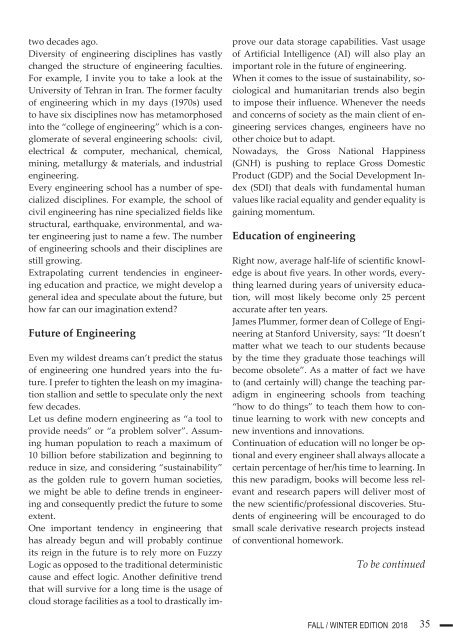Mohandes Magazine Fall-Winter Edition 2018
Create successful ePaper yourself
Turn your PDF publications into a flip-book with our unique Google optimized e-Paper software.
two decades ago.<br />
Diversity of engineering disciplines has vastly<br />
changed the structure of engineering faculties.<br />
For example, I invite you to take a look at the<br />
University of Tehran in Iran. The former faculty<br />
of engineering which in my days (1970s) used<br />
to have six disciplines now has metamorphosed<br />
into the “college of engineering” which is a conglomerate<br />
of several engineering schools: civil,<br />
electrical & computer, mechanical, chemical,<br />
mining, metallurgy & materials, and industrial<br />
engineering.<br />
Every engineering school has a number of specialized<br />
disciplines. For example, the school of<br />
civil engineering has nine specialized fields like<br />
structural, earthquake, environmental, and water<br />
engineering just to name a few. The number<br />
of engineering schools and their disciplines are<br />
still growing.<br />
Extrapolating current tendencies in engineering<br />
education and practice, we might develop a<br />
general idea and speculate about the future, but<br />
how far can our imagination extend?<br />
Future of Engineering<br />
Even my wildest dreams can’t predict the status<br />
of engineering one hundred years into the future.<br />
I prefer to tighten the leash on my imagination<br />
stallion and settle to speculate only the next<br />
few decades.<br />
Let us define modern engineering as “a tool to<br />
provide needs” or “a problem solver”. Assuming<br />
human population to reach a maximum of<br />
10 billion before stabilization and beginning to<br />
reduce in size, and considering “sustainability”<br />
as the golden rule to govern human societies,<br />
we might be able to define trends in engineering<br />
and consequently predict the future to some<br />
extent.<br />
One important tendency in engineering that<br />
has already begun and will probably continue<br />
its reign in the future is to rely more on Fuzzy<br />
Logic as opposed to the traditional deterministic<br />
cause and effect logic. Another definitive trend<br />
that will survive for a long time is the usage of<br />
cloud storage facilities as a tool to drastically improve<br />
our data storage capabilities. Vast usage<br />
of Artificial Intelligence (AI) will also play an<br />
important role in the future of engineering.<br />
When it comes to the issue of sustainability, sociological<br />
and humanitarian trends also begin<br />
to impose their influence. Whenever the needs<br />
and concerns of society as the main client of engineering<br />
services changes, engineers have no<br />
other choice but to adapt.<br />
Nowadays, the Gross National Happiness<br />
(GNH) is pushing to replace Gross Domestic<br />
Product (GDP) and the Social Development Index<br />
(SDI) that deals with fundamental human<br />
values like racial equality and gender equality is<br />
gaining momentum.<br />
Education of engineering<br />
Right now, average half-life of scientific knowledge<br />
is about five years. In other words, everything<br />
learned during years of university education,<br />
will most likely become only 25 percent<br />
accurate after ten years.<br />
James Plummer, former dean of College of Engineering<br />
at Stanford University, says: “It doesn’t<br />
matter what we teach to our students because<br />
by the time they graduate those teachings will<br />
become obsolete”. As a matter of fact we have<br />
to (and certainly will) change the teaching paradigm<br />
in engineering schools from teaching<br />
“how to do things” to teach them how to continue<br />
learning to work with new concepts and<br />
new inventions and innovations.<br />
Continuation of education will no longer be optional<br />
and every engineer shall always allocate a<br />
certain percentage of her/his time to learning. In<br />
this new paradigm, books will become less relevant<br />
and research papers will deliver most of<br />
the new scientific/professional discoveries. Students<br />
of engineering will be encouraged to do<br />
small scale derivative research projects instead<br />
of conventional homework.<br />
To be continued<br />
FALL / WINTER EDITION <strong>2018</strong><br />
35






